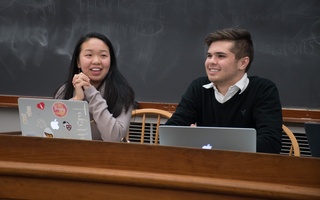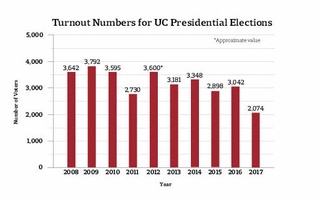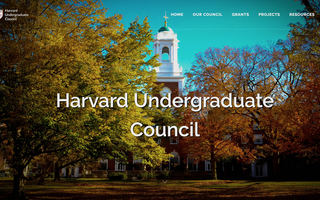The Undergraduate Council’s next President and Vice President will lead the UC and the College through a pivotal year on campus, given University President Drew G. Faust’s departure and other University-wide changes. The candidates’ input on social group policy, space and accessibility, and student health, among other issues, will have lasting effects on life at the College. With this in mind, while all three tickets for UC leadership bring valuable ideas to the table, we endorse the candidacy of Catherine L. Zhang ’19 for President and Nicholas D. Boucher ’19 for Vice President.
As the only ticket containing two current UC representatives, Zhang and Boucher would bring a wealth of experience to the UC leadership. As we have previously opined, the UC is often hampered by unrealistic campaign promises and low turnout in its elections. Yet, given Zhang and Boucher’s achievements on the Council—Zhang’s role as a leader of and participant in a wide range of successful initiatives, and Boucher’s advances regarding fundraising and technology—we believe that they have the potential to meaningfully impact the Council.
The Zhang-Boucher ticket’s commitment to accountability is appealing. While their aims are as lofty as those of their peers, Zhang and Boucher put a greater emphasis on transparency than the others in the race. Their promise to place a “progress bar” on each of their initiatives is a promising way to show the student body the extent to which they’ve followed through. Accountability and openness to criticism are paramount for individuals seeking to represent the entire student body, and we are particularly hopeful about Zhang and Boucher in that regard.
This is not to say, however, that the Zhang-Boucher ticket is completely without fault. Perhaps most saliently, its website conspicuously lacks a stance on the social group policies that some decry. Their stance was clarified during The Crimson-hosted Crossfire Debate on Sunday, and even though they acknowledged the need for some kind of sanctions on final clubs, they do not publicly support the current social group sanctions policy.
Nevertheless, Zhang and Boucher’s commitment to building social spaces on campus, with special attention to first-year, accessible, and House-based spaces, in addition to their advocacy for a multicultural center and their plans to fund social initiatives, shows a focus on inclusivity beyond the debate on unrecognized social organizations.
Furthermore, because every ticket has valuable ideas unique to its platform, the next UC President and Vice President, whomever they may be, can best serve the campus by deeply engaging with and evaluating the other candidates’ proposals. Besides Zhang and Boucher’s aims, Victor C. Agbafe ’19 and running mate Michael K. Bervell ’19 offer a plethora of interesting initiatives, as does the third ticket of Conor Healy ’19 and running mate Parth C. Thakker ’19.
Ultimately, the most important qualities the next UC leader should possess are a fundamental understanding of the concerns of the student body, and an enthusiasm in a reasonable plan to implement policy. Zhang and Boucher’s extensive experience on the UC, transparency with regard to their progress, and tangible plans to finance their initiatives make them the best choice for the coming year.
This staff editorial solely represents the majority view of The Crimson Editorial Board. It is the product of discussions at regular Editorial Board meetings. In order to ensure the impartiality of our journalism, Crimson editors who choose to opine and vote at these meetings are not involved in the reporting of articles on similar topics.
Read more in Opinion
A Prodigal Protestant, Part II

















